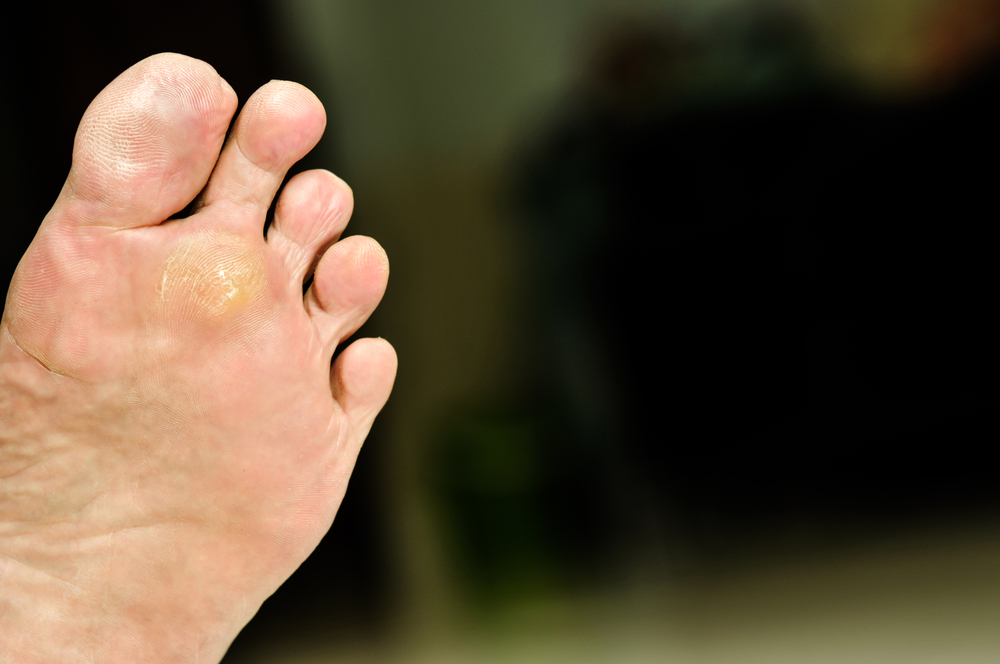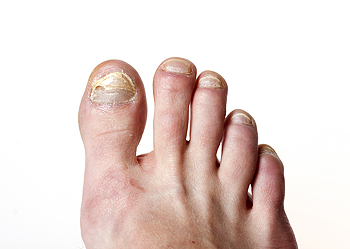Blog
 Plantar warts are small, rough, fleshy growths that can appear on the bottom of the foot. They are caused by the virus known as HPV and enter the body through a cut or break in the skin. Plantar warts typically appear at the base of the toes or on the heel. Their appearance is characterized by black pinpoints and a grainy texture. Plantar warts may cause pain when walking or standing, and can sometimes grow inwards, forming a callus. The wart might also cause lesions that can change the normal lines and ridges of the skin on the bottom of the foot. If you think you may have a plantar wart, it is suggested that you seek the care of a podiatrist.
Plantar warts are small, rough, fleshy growths that can appear on the bottom of the foot. They are caused by the virus known as HPV and enter the body through a cut or break in the skin. Plantar warts typically appear at the base of the toes or on the heel. Their appearance is characterized by black pinpoints and a grainy texture. Plantar warts may cause pain when walking or standing, and can sometimes grow inwards, forming a callus. The wart might also cause lesions that can change the normal lines and ridges of the skin on the bottom of the foot. If you think you may have a plantar wart, it is suggested that you seek the care of a podiatrist.
Plantar warts can be very uncomfortable. If you need your feet checked, contact Dr. Dean D. Hinners from Illinois. Our doctor will assist you with all of your foot and ankle needs.
About Plantar Warts
Plantar warts are the result of HPV, or human papillomavirus, getting into open wounds on the feet. They are mostly found on the heels or balls of the feet.
While plantar warts are generally harmless, those experiencing excessive pain or those suffering from diabetes or a compromised immune system require immediate medical care. Plantar warts are easily diagnosed, usually through scraping off a bit of rough skin or by getting a biopsy.
Symptoms
- Lesions on the bottom of your feet, usually rough and grainy
- Hard or thick callused spots
- Wart seeds, which are small clotted blood vessels that look like little black spots
- Pain, discomfort, or tenderness of your feet when walking or standing
Treatment
- Freezing
- Electric tool removal
- Laser Treatment
- Topical Creams (prescription only)
- Over-the-counter medications
To help prevent developing plantar warts, avoid walking barefoot over abrasive surfaces that can cause cuts or wounds for HPV to get into. Avoiding direct contact with other warts, as well as not picking or rubbing existing warts, can help prevent the further spread of plantar warts. However, if you think you have developed plantar warts, speak to your podiatrist. He or she can diagnose the warts on your feet and recommend the appropriate treatment options.
If you have any questions please feel free to contact one of our offices located in Metropolis and Eldorado, IL . We offer the newest diagnostic and treatment technologies for all your foot and ankle needs.
 Plantar warts are small, rough, fleshy growths that can appear on the bottom of the foot. They are caused by the virus known as HPV and enter the body through a cut or break in the skin. Plantar warts typically appear at the base of the toes or on the heel. Their appearance is characterized by black pinpoints and a grainy texture. Plantar warts may cause pain when walking or standing, and can sometimes grow inwards, forming a callus. The wart might also cause lesions that can change the normal lines and ridges of the skin on the bottom of the foot. If you think you may have a plantar wart, it is suggested that you seek the care of a podiatrist.
Plantar warts are small, rough, fleshy growths that can appear on the bottom of the foot. They are caused by the virus known as HPV and enter the body through a cut or break in the skin. Plantar warts typically appear at the base of the toes or on the heel. Their appearance is characterized by black pinpoints and a grainy texture. Plantar warts may cause pain when walking or standing, and can sometimes grow inwards, forming a callus. The wart might also cause lesions that can change the normal lines and ridges of the skin on the bottom of the foot. If you think you may have a plantar wart, it is suggested that you seek the care of a podiatrist.
Plantar warts can be very uncomfortable. If you need your feet checked, contact Dr. Dean D. Hinners from Illinois. Our doctor will assist you with all of your foot and ankle needs.
About Plantar Warts
Plantar warts are the result of HPV, or human papillomavirus, getting into open wounds on the feet. They are mostly found on the heels or balls of the feet.
While plantar warts are generally harmless, those experiencing excessive pain or those suffering from diabetes or a compromised immune system require immediate medical care. Plantar warts are easily diagnosed, usually through scraping off a bit of rough skin or by getting a biopsy.
Symptoms
- Lesions on the bottom of your feet, usually rough and grainy
- Hard or thick callused spots
- Wart seeds, which are small clotted blood vessels that look like little black spots
- Pain, discomfort, or tenderness of your feet when walking or standing
Treatment
- Freezing
- Electric tool removal
- Laser Treatment
- Topical Creams (prescription only)
- Over-the-counter medications
To help prevent developing plantar warts, avoid walking barefoot over abrasive surfaces that can cause cuts or wounds for HPV to get into. Avoiding direct contact with other warts, as well as not picking or rubbing existing warts, can help prevent the further spread of plantar warts. However, if you think you have developed plantar warts, speak to your podiatrist. He or she can diagnose the warts on your feet and recommend the appropriate treatment options.
If you have any questions please feel free to contact one of our offices located in Metropolis and Eldorado, IL . We offer the newest diagnostic and treatment technologies for all your foot and ankle needs.
Read more about What Are Plantar Warts? Research has indicated that toenail fungus rarely affects children, but can develop as the aging process occurs. It occurs as a result of the fungus entering the toenail through a small crack in the nail, and will gradually spread when shoes and socks are worn throughout the day. Some of the symptoms that are associated with this ailment can consist of the toenails becoming thick and yellowed, and in severe cases, the nail may lift off of the nail bed. This type of fungus lives and thrives in warm and moist environments, and is often found in public swimming pools, showers room floors, and surrounding areas. It is helpful to wear appropriate shoes while in these types of places, as this may help to reduce the risk of spreading toenail fungus. Toenail fungus is considered to be contagious, and it is beneficial to refrain from sharing towels, socks and shoes. If you are afflicted with this condition, it is suggested that you seek the counsel of a podiatrist who can offer you effective treatment options.
Research has indicated that toenail fungus rarely affects children, but can develop as the aging process occurs. It occurs as a result of the fungus entering the toenail through a small crack in the nail, and will gradually spread when shoes and socks are worn throughout the day. Some of the symptoms that are associated with this ailment can consist of the toenails becoming thick and yellowed, and in severe cases, the nail may lift off of the nail bed. This type of fungus lives and thrives in warm and moist environments, and is often found in public swimming pools, showers room floors, and surrounding areas. It is helpful to wear appropriate shoes while in these types of places, as this may help to reduce the risk of spreading toenail fungus. Toenail fungus is considered to be contagious, and it is beneficial to refrain from sharing towels, socks and shoes. If you are afflicted with this condition, it is suggested that you seek the counsel of a podiatrist who can offer you effective treatment options.
For more information about treatment, contact Dr. Dean D. Hinners of Illinois. Our doctor can provide the care you need to keep you pain-free and on your feet.
Toenail Fungus Treatment
Toenail fungus is a condition that affects many people and can be especially hard to get rid of. Fortunately, there are several methods to go about treating and avoiding it.
Antifungals & Deterrence
Oral antifungal medicine has been shown to be effective in many cases. It is important to consult with a podiatrist to determine the proper regiment for you, or potentially explore other options.
Applying foot powder on the feet and shoes helps keep the feet free of moisture and sweat.
Sandals or open toed shoes – Wearing these will allow air movement and help keep feet dry. They also expose your feet to light, which fungus cannot tolerate. Socks with moisture wicking material also help as well.
If you have any questions please feel free to contact one of our offices located in Metropolis and Eldorado, IL . We offer the newest diagnostic tools and technology to treat your foot and ankle needs.

